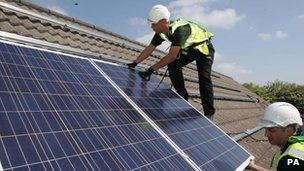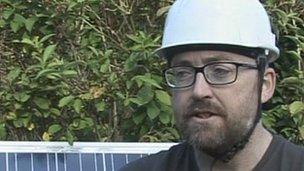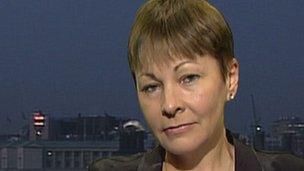Dorset solar boss sees rush ahead of tariff cut
- Published

The solar industry employs about 25,000 people
The boss of a solar panel firm in Dorset believes government plans to halve the subsidy for new installations will "decimate" the industry and is leading to a last-minute rush to beat the deadline.
The tariff for electricity generated by the panels is to be cut from 43.3p per kilowatt hour to 21p for anyone who had their system installed after 12 December.
Solar company boss Andy Thompson said he could not "comprehend" the move and said the short notice had led to a rush on supplies as fitters try to bring forward installations.
"The very short notice has really dropped people in it," the director of Dorset Solar Power, based in Blandford, added.
"There are guys that have got work booked through to January/February time and those installations are going to be cancelled.
Average £11,700 cost
"They will have to give customers' deposits back if they can't get the capacity to install them before the deadline.
"Because of the rush... there is a shortage of equipment, it's kicking a man when he's down. It is going to decimate the solar industry."
According to the Energy Saving Trust, the average cost of a solar system is about £11,700, with savings on electricity bills put at about £1,200 per year.
It means households will see a return after about 10 years.
But the new scheme will see this length of time double.
The government has been forced to allocate a cap of £867m to pay for the tariff due to an increase in demand for panels as the price of the systems fall.

Solar boss Andy Thompson said the industry supported a smaller tariff cut from next April
Speaking in an emergency debate at the House of Commons, Climate Change Minister Gregory Barker said the government risked running out of money by next year.
"Falling PV [photovoltaic] costs mean returns are double those originally envisaged for this scheme, this does not provide value for money.
"If we don't act now the entire £867m budget would be fully committed within the next few months," said Mr Barker.
Mr Thompson admitted the tariff needed to be cut but criticised the speed of the decision.
"The price of the equipment has dropped by about 30%, not the 70% it has been suggested in the media, and so the tariff was too generous," he added.
'Changing the rules'
"A lot of people in the industry thought about 30p per unit would have been a reasonable sum and expected that to be in April (2012).
"It's beyond my comprehension what the thinking was behind this [the new terms].
"I cannot think of any logical reason why you would do that and destroy an industry of 25,000 people."

Green MP Caroline Lucas said it would deter firms from investing in solar energy
Green MP Caroline Lucas said it was "bad news" for the environment and the image of renewable energy.
She said: "I think it is sending out a very troubling signal both to industry and to consumers.
"For industry, it's changing the rules of the game halfway through so it means they can't plan with any certainty, they can't know that it is safe to invest in solar.
"This is bad news for the economy, it is bad news for British jobs and it is certainly bad news for the environment as well."
The government said the new tariff would bring the UK more in line with subsidy levels in Germany.
Ministers also said they would consult on a community tariff to support schemes aimed at helping households on low incomes.
- Published31 October 2011
- Published31 October 2011
- Published21 October 2011
- Published7 May 2011